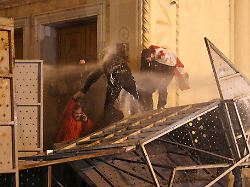Street battle in front of Parliament
Protests against “agent” law in Tbilisi are growing
03/08/2023 10:12 p.m
After concerns about a pro-Russian orientation in Georgian politics and the approval of a controversial media law, thousands of people demonstrated in Tbilisi for the second day in a row. Some demonstrators are said to have tried to break into parliament. The police act ruthlessly.
For the second day in a row, security forces used tear gas and water cannons against demonstrators during anti-government protests in the Georgian capital Tbilisi. According to eyewitness reports, the demonstrators surrounded the parliament of the South Caucasus republic; some also tried to enter the building. As a result, the strong police forces used tear gas and water cannons, as the evening before, as pictures from Russian and Georgian news agencies and television stations showed. Observers estimated the number of demonstrators at 10,000 to 15,000. It was more than on Tuesday evening.
The protest was sparked by a controversial draft law: Similar to Russia, the Georgian leadership wants to classify media and non-governmental organizations that are supported from abroad as foreign agents.
Yesterday, Tuesday, there were clashes with the police during protests in front of Parliament, and dozens of people were arrested. Authorities announced 66 arrests on Wednesday. They accused the demonstrators of throwing stones and other objects at police officers and later attacking the parliament with incendiary devices and firecrackers. Almost 50 police officers were injured. Civilians were also injured, but the authorities did not give any figures.
Design reminiscent of Kremlin law
Tens of thousands of people with flags of Georgia and the EU marched in front of the parliament in the capital Tbilisi in the evening after the law was approved in the first reading in parliament. According to the opposition, the law is intended to intimidate media and non-governmental organizations critical of the government. President Salome Zurabishvili also condemned the proposed law.
The draft law stipulates that organizations that receive more than 20 percent of their financial resources from abroad must register as so-called foreign agents. Otherwise they face penalties. The bill is reminiscent of a law passed in Russia in 2012. The Kremlin has since used this law extensively to crack down on the media, anti-government organizations and other critics.
During the protests on Wednesday, which the opposition and civil society groups had called for, demonstrators also blocked Tbilisi’s main thoroughfare. They called on the government to drop the bill and chanted slogans like “No to the Russian law”. The police and the opposition initially gave no information on the number of demonstrators, according to estimates by an AFP correspondent there were tens of thousands.
Controversy over foreign policy direction
President Zurabishvili supported the protesters. “Today you represent a free Georgia that sees its future in Europe and will not let anyone rob that future,” she said during a visit to New York. She announced her veto against the law – but the governing party Georgian Dream can override this with its absolute majority in parliament.
The small former Soviet republic of Georgia is actually aiming to join the EU and NATO. Recently, however, several government measures have fueled fears that the country could turn to Russia under Prime Minister Irakli Garibashvili. This speaks of a “balanced” policy that should ensure “peace and stability”.
Meanwhile, Ukrainian President Zelenskyy expressed his solidarity with the protesters. In his nightly video address to the Ukrainian people, Zelenskyy said: “There is not a single Ukrainian who would not wish Georgia, our friend, success. Democratic success. European success.” All “free nations of Europe” deserve to be part of the EU.
